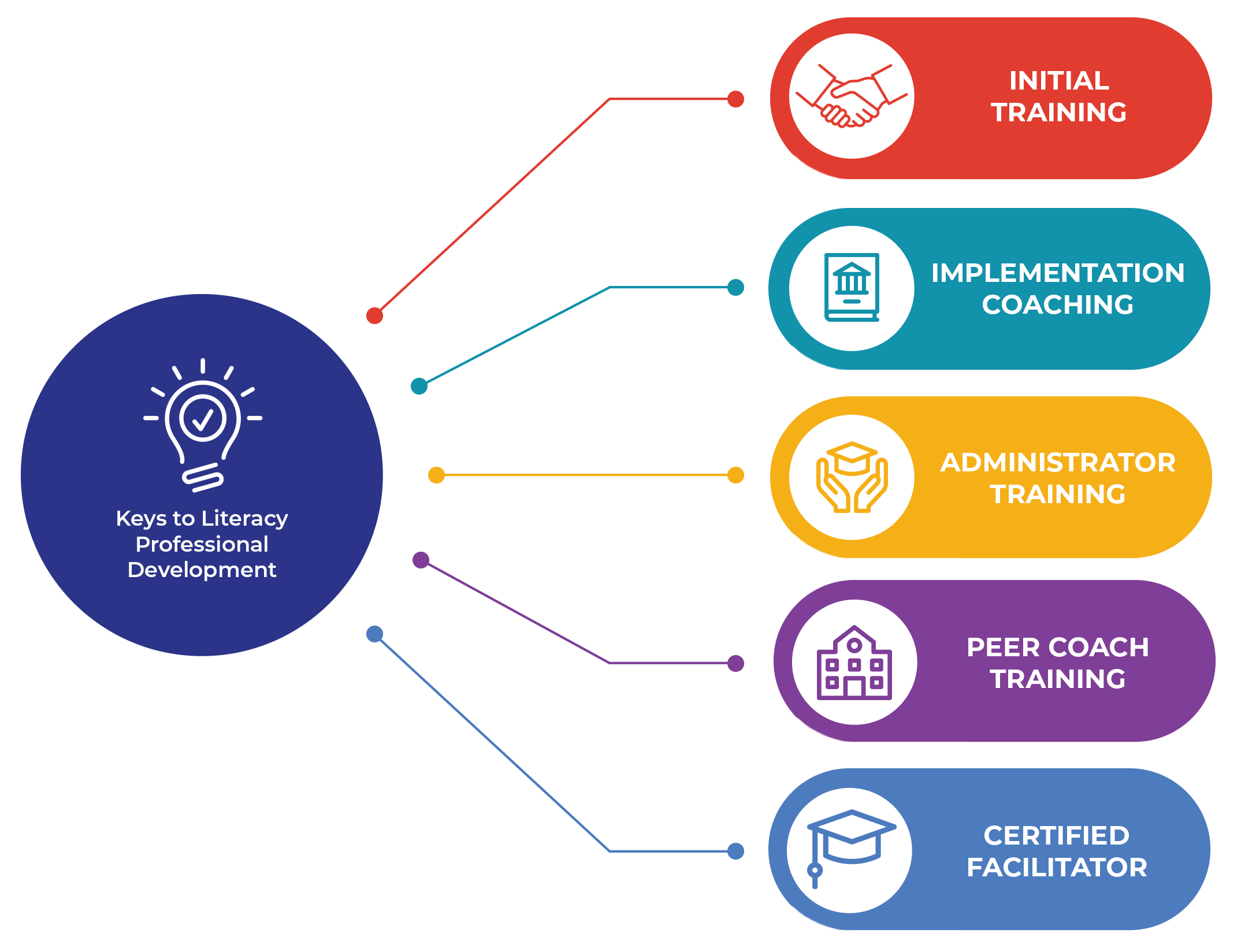We all know that one-time, “drive-by” training does not work! Effective training that leads to real change in teacher practice only happens when professional learning is engaging, relevant, long-term, and tailored to teacher needs.
Keys to Literacy professional learning provides the kinds of learning experiences that have the greatest impact on teachers’ knowledge, practice, and ultimately student learning. We draw from the research consensus that professional learning should:
- be sustained over a period of time
- be school-wide and part of school reform plans
- include peer-coaching
- focus on teacher instruction and practice
- provide opportunities for peer collaboration and observation
- be supported and reinforced by leadership
Learn more about the research on effective professional learning.
Components of the Keys to Literacy PD Model
When you choose to bring Keys to Literacy teaching strategies into your school or district, we will help you build a professional learning plan that includes the four components shown in the graphic organizer below. Your plan will combine training for teachers, administrators, and building-based coaches with implementation coaching to support long-term use of Keys to Literacy instructional practices.

Initial Training for Teachers
During initial training, participants learn the instructional practices that make up a KTL PD program. KTL trainers use PowerPoint presentations, training activities, sample classroom lessons and examples, and training books or handouts. Teachers practice activities and begin planning lessons so they can start using the teaching suggestions right away. Initial training ranges from one to multiple days depending on the KTL program that is the focus of the training. Ideally, group size for initial training should be no more than 35.
Implementation Coaching
After initial training, implementation coaching is vital to the successful adoption of KTL instructional practices. On Implementation Coaching days, KTL trainers conduct sessions with small groups of teachers that include small-group shares of program use, sample lesson walkthroughs, guided lesson planning, classroom observations and debriefs, and demonstration lessons. The focus of Implementation Coaching days is to support implementation of the instructional practices that teachers learned during initial training. Typically, all-school PD days are not needed for these coaching days – most schools use existing common planning time or a small number of substitutes to provide time for teachers to meet with the trainer.
PD for Administrators
KTL strongly recommends that building administrators attend initial training with teachers so they can understand what teachers have learned. In addition, KTL offers half- to full-day workshops for administrators to help them promote and support implementation. This includes learning how to recognize classroom use, how to conduct KTL program walkthroughs, and how to use the implementation materials available at our password-protected online resource center.
PD for Building Coaches
A key factor in long-term sustainability is the training of site-based peer coaches. Ultimately, KTL trainers want to gradually release the responsibility for providing implementation coaching to the school building. Peer coaches can come from the ranks of classroom teachers, mentor or master teachers, literacy specialists and coaches, or individuals who are already in an instructional coaching role. KTL offers coach training that allows participants to more deeply learn the instructional practices that teachers learn during initial training, as well as learn coaching techniques and activities. Coach PD is typically two days and can be accessed several ways: scheduling an onsite coaching session, sending participants to an “open to the public” session run by KTL, or in some cases by taking our coaching online course.
Additional Implementation Support Options
The four key PD components described above will make up the core of the training days for your PD plan. There are several additional options for supporting PD and implementation that can be added to your PD plan, including the following.
Phone and Video-Conference Support: KTL trainers can provide implementation coaching to teachers, administrators or peer coaches by the hour. These sessions are customized based on your school/district needs.
Use KTL Online Courses: Many of our PD programs have associated online training courses. They can be used to provide a review to teachers who have attended initial training, or as a way to train new teachers who have missed initial training. Visit the online course page of the KTL website to learn more about these courses: https://keystoliteracy.com/delivery/online-pd/
Book Study: Free book study guides are available that are aligned to our training books. In-house staff can facilitate book discussions with teachers to review some or all of the instructional practices from initial training. If requested, a KTL trainer will use video-conferencing to facilitate book study sessions.
Password Protected Online Resource Center: Administrators and people trained as peer coaches are given free access to a password protected section of the KTL website where they will find a large collection of resources that support implementation of KTL PD programs.
Certified Facilitators
Our certified facilitator model allows a Licensed Certified Facilitator to provide professional learning for specific Keys to Literacy programs through a blended training approach, combining in-person facilitation with an online course. This model not only cultivates the development of internal expertise and supports the growth of leadership, but also fosters a collaborative learning environment. Empowering educators within their own organizations creates a sustainable professional learning solution that enhances teaching practices and student outcomes.
Learn more about the certified facilitator model.
